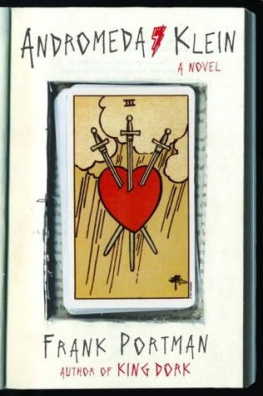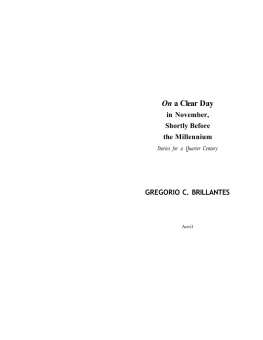Gregorio C. Brillantes - The Distance to Andromeda and Other Stories
Here you can read online Gregorio C. Brillantes - The Distance to Andromeda and Other Stories full text of the book (entire story) in english for free. Download pdf and epub, get meaning, cover and reviews about this ebook. year: 1960, publisher: The Benipayo Press, genre: Art. Description of the work, (preface) as well as reviews are available. Best literature library LitArk.com created for fans of good reading and offers a wide selection of genres:
Romance novel
Science fiction
Adventure
Detective
Science
History
Home and family
Prose
Art
Politics
Computer
Non-fiction
Religion
Business
Children
Humor
Choose a favorite category and find really read worthwhile books. Enjoy immersion in the world of imagination, feel the emotions of the characters or learn something new for yourself, make an fascinating discovery.
- Book:The Distance to Andromeda and Other Stories
- Author:
- Publisher:The Benipayo Press
- Genre:
- Year:1960
- Rating:5 / 5
- Favourites:Add to favourites
- Your mark:
- 100
- 1
- 2
- 3
- 4
- 5
The Distance to Andromeda and Other Stories: summary, description and annotation
We offer to read an annotation, description, summary or preface (depends on what the author of the book "The Distance to Andromeda and Other Stories" wrote himself). If you haven't found the necessary information about the book — write in the comments, we will try to find it.
The Distance to Andromeda and Other Stories — read online for free the complete book (whole text) full work
Below is the text of the book, divided by pages. System saving the place of the last page read, allows you to conveniently read the book "The Distance to Andromeda and Other Stories" online for free, without having to search again every time where you left off. Put a bookmark, and you can go to the page where you finished reading at any time.
Font size:
Interval:
Bookmark:




The Distance to Andromeda
and Other Stories
GREGORIO C. BRILLANTES
University of the Philippines Press
Quezon City

Contents
Preface ix
The Years 3
The Young Man 19
Faith, Love, Time and Dr. Lazaro 29
The Exiles 41
My Cousin Ramon 47
The Radio and the Green Meadows 55
The Girl Elena 65
Blue Piano 71
Lost 81
The Distance to Andromeda 91
The Last December 105
A Wilderness 113
The Beautiful Gerrls 123
A Wind Over the Earth 133
The Mountains 143
Sunday 153
The Rice Fields 163
The Sound of Distant Thunder 169
The Rain 177
The Living and the Dead 189
The Strangers 203
What Shall We Do When We All Go Out ? 211
The Conquerors 219
The World of the Moon 227
The Light and Shadow of Leaves 235
Afterword 251

"WHY DO you write?" the girl asked suddenly. The author was seventeen or eighteen and had written some fiction, including the earliest piece in this collection. I suppose a lady was bound to ask him that sooner or later, as he liked hanging around them though not strictly for literary or artistic reasons. Anyway, the question startled him, as she was a cheerful, laughing kind of girl, so unlike the melancholy poetess he adored that year; and the way she asked it, serious all of a sudden, in the middle of a party yet, in the middle of a dance with her, as a matter of fact, really surprised him. Now if she had waited a few more years to ask her earnest question, I think he might have given her a brighter, more satisfying, more quotable answer than the one he managed to mumble, about the need to see one's name in print.
Her name was Mercedes; Ditas, everyone called her; a student at the Assumption Convent, then on Herran and Dakota and neighbor to the college he attended. He had gone to her coming-out party, a more elegant affair than the usual barn dances of those days, complete with orchestra and uniformed waiters and lanterns over the lawn. It seemed she had read a story he had written for his college quarterly: a tor-mented piece, dreadful in more ways than one, that his Jesuit professors might have decried as the work of a budding Jansenist untouched by the happy Catholic wisdom of Chesterton and Belloc. True enough, along with his crew cut and a modest crop of acne, he cultivated a species of literary despair, fashionable then among apprentice fictionists no less than their established elders; but this apparently didn't prevent him from having a good time at parties and dancing with Assumption girls. A devout daughter of Mother Esperanza, the girl Ditas might have been prompted by some anxiety for his salvation.
They were dancing to a slow sentimental tune, Sinatra or Tony Bennett, it must have been, background music for that placid, faraway time; and then, unexpectedly, she asked him why he wrote, the concern shining in her clear alert eyes. She seemed to strain forward as she waited for his brilliant, magnificent, tremendous, unforgettable answer.
He made his vague, forgettable reply. The anticipation faded from her eyes. They talked of inconsequential things. She laughed prettily, made a funny face, her brisk happy self again. The music stopped and he walked her back to her seat.
They met and talked a few more times, rather by chance, without so much as a hint of the question she had asked on the night of her birthday. She married a classmate of his, a pious, studious fellow who took up law, management and poker. A few years later she was dead.
Wealth, status, intensive care units, the prayers of nuns: they were to no avail. I guess it happens all the time: men lost at sea, children trapped in burning apartments, women dying in childbirth. A famous theolo-gian whose books she must have read in school put it very nicely: the twisted threads, seemingly without any pattern of meaning, behind God's glorious tapestry.
When he read the obit, he remembered the way she looked that night she asked her sudden question, the concern shining in her young eyes. He didn't think of her again after that, not until many years later, when somebody, a guy who had known her, or a friend of a friend of hers, called her to mind, in a bar or nightclub or maybe by the pool at his compadre's place on a Sunday morning, with their wives and the kids splashing around in the bright sun. For some reason, this time, the memory of Ditas stayed awhile with him. I imagine it was one of those curious things writers are wont to do, recalling some tiny or trivial incident other people would never bother about and maybe hoping it will lead to something or other.
Through the day or the space of an evening, he remembered her again, and the night of her party. He realized she had been the first ever to a$k him why he wrote; and reflecting on this, he began to think of her as though she had been real and unreal at the same time, something like an archetype, a symbol. It was as though she assumed, in his short story writer's mind, a life not unlike the existence of the woman who lost the borrowed necklace of fake pearls, or the old carriage driver who had only his horse to talk to, or the young man who brought home a wife to Nagrebcan. By some process that, I am told, critics can ana-lyze and explain, he recreated and transformed her, as it were, so that she would stand still and listen, she would not go away forever after the dance and he might begin at last to answer her question.
He thought, then, in the dim bar or the summer morning by the pool, of what he should have said in answer. He owed her that much, he felt, for her wish to understand, when they were both young, that which was deepest and most important in his life. The answer, he knew, was tied up somehow with the town in Tarlac where he was born, and the acacias beside the house where he grew up, the sounds that wind and fain made in them. In that house, its rooms suffused with a clear white light in his memory, he learned that words, combinations of them, could unlock the doors to fancy and fable: the strange lands visited by Gulliver, Lord Greystoke shipwrecked on the African shore. His mother had a drugstore in Camiling when he was a boy, and through its mostrador, a glass display case like an aquarium, he loved to watch the refracted traffic of carromatas and buses, and all sorts of people coming by, prominent and humble folk with their aches, anxieties and doctor's prescriptions, and kin and friends with news or stories to tell.
One morning a woman lay down on the pavement in front of the farmacia} weeping and begging to be given some poison until a policeman came and led her away. Beside the plaza was the church, with the eye of God in a blue triangle painted crudely on a canvas screen near the door. A block from the church was the high school that had been the house built by his grandfather. The summer he was thirteen he opened a cabinet in the ancient house and uncovered a hoard of magazines from the 1930s, brittle, brownish copies of the Free Press and Graphic containing the first stories of Manuel Arguilla and Bienvenido N. Santos, C.V Pedroche and D. Paulo Dizon. Perhaps it was in the same year that he found Maupassant and Maugham in an uncle's bookcase, not long before a friend gave him a stack of Liberation-era paper-backs: Hemingway, Steinbeck, Wolfe, Saroyan. His father's copy of the
Next pageFont size:
Interval:
Bookmark:
Similar books «The Distance to Andromeda and Other Stories»
Look at similar books to The Distance to Andromeda and Other Stories. We have selected literature similar in name and meaning in the hope of providing readers with more options to find new, interesting, not yet read works.
Discussion, reviews of the book The Distance to Andromeda and Other Stories and just readers' own opinions. Leave your comments, write what you think about the work, its meaning or the main characters. Specify what exactly you liked and what you didn't like, and why you think so.

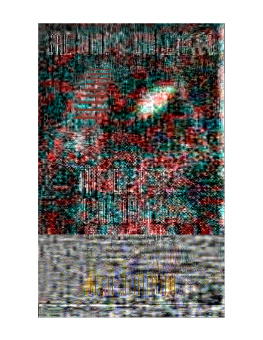

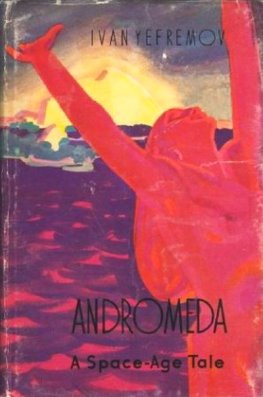


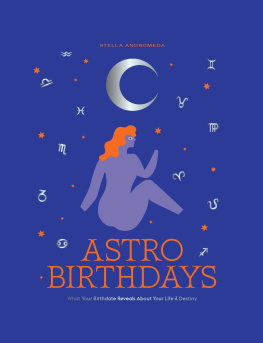
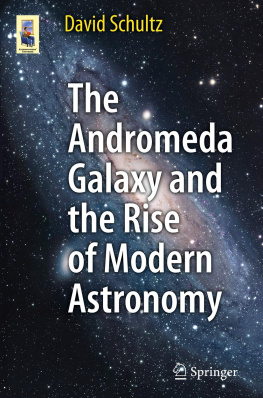
![Wendelle C. Stevens - UFO Contact from Andromeda: Extraterrestrial Prophecy [face to face]](/uploads/posts/book/133614/thumbs/wendelle-c-stevens-ufo-contact-from-andromeda.jpg)

